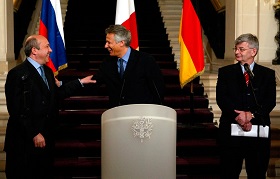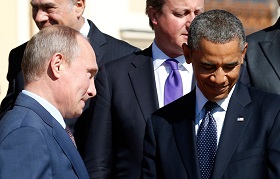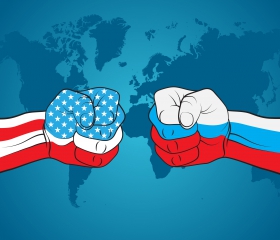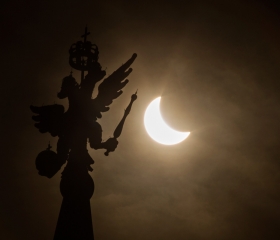New Aspects of the Ukraine Crisis: Civil Society
(no votes) |
(0 votes) |
PhD in Political Science, RIAC Program Manager
The Ukrainian and Russian-Western crises seem a long way from resolution, and are starting to affect the areas of relations intended to maintain contact and help break political deadlock. What kind of future is in store for expert-level dialogue, educational exchanges and interaction between Russian and Western media?
The Ukrainian and Russian-Western crises seem a long way from resolution, and are starting to affect the areas of relations intended to maintain contact and help break political deadlock. What kind of future is in store for expert-level dialogue, educational exchanges and interaction between Russian and Western media?
Expert Dialogue Almost in Tatters
The trilateral report "Managing Differences in European Security in 2015: US, Russian, and European Perspectives" prepared jointly by the Atlantic Council of the United States, the European Leadership Network and the Russian International Affairs Council (RIAC) says that "Official pressure has largely stifled debate in Russian civil society, while the Western debate is still focusing on putting the blame rather than on nontrivial solutions of the problem." The statement on debate in Russia appears an exaggeration, as expert and civil society regularly take part in roundtables and seminars offering a detailed discussion of the Ukraine situation and possible resolutions, and Russia-West relations. Numerous such events featuring Russian and foreign participation are hosted by RIAC and other Russian think tanks. The media and scholarly journals cover these matters frequently and genuinely provide a range of different opinions. But in most cases the conclusion is that Russia and the West are thinking in diverging systems, trust has been undermined, and the Ukraine crisis requires an urgent solution. In most cases, the question is about the ways to do it.
Regrettably, the Ukraine and Russia-West crises are disastrous for expert-level dialogue. International encounters between pundits descend into mutual accusations, whereas their key mission would ideally be to listen to each other, try to reach a consensus and produce recommendations for their respective governments on tackling these highly complex political problems. What we urgently need is to resume business-as-usual dialogue and our joint search for solutions to the challenges facing the global community.
Russian and Western experts may differ on their interpretation of events and codes of behavior, but they need to reach a consensus on basic principles and the common denominator in their approach to dealing with the situation and the Russia-West controversy. This is the contribution expected from the expert community at this stage.
There is a plethora of questions. Why did leaders on both sides fail to prevent the current crisis? Why is Russia so bitter about the West? Why is there so much acrimony despite the frequency of civil society contact? Civil society activists interact directly, making this activity a component of international relations. And particular attention should be paid to the mistakes that Russian and Western leaders have made over the past 20 years, which brought us to this current state of affairs.
It would be an overstatement to fix the blame entirely on both sides’ government propaganda. Just like the United States and Europeans, Russia is an open country whose citizens travel abroad, interact and work with foreigners, and they are free to come to their own conclusions on the basis of their own experiences. But now their opinions are utterly downbeat.
In most cases the conclusion is that Russia and the West are thinking in diverging systems, trust has been undermined, and the Ukraine crisis requires an urgent solution.
What is the media’s role in these developments and the emergence of this apparently reciprocal repulsion? The media is now far from being unbiased, so it is the experts and the civil society leaders who could erect a barrier to the black-and-white perception of the events delivered by the media. Objective facts require informed assessment.
What we need is contact between research centers, institutes and think tanks rather than between individual researchers. Investigations would be more systemic and cover broader groups of problems. Recommendations presented by these institutions would definitely be more impressive. Academics and analysts often complain that decision-makers pay scant attention to their advice. Although it appears difficult to provide a clear-cut answer, the decision makers seem to require long-term studies because they tend to respond reactively and rarely have time to forecast the relatively distant future. Hence, the focus must be on research offering a longer-term perspective.
Anti-Americanism in Russia is on the rise, perhaps at its peak for the past decade.
The Track 1.5 debate on the search for solutions to today’s international disarray is definitely hampered by new black lists of former Western politicians, since some would be eager to discuss the situation with their Russian counterparts, and to develop recommendations for the incumbent leaders.. But the greatest harm to the Russia-West relationship definitely emanates from the anti-Russian sanctions.
Politicizing the Nonpolitical
Political tensions are slowly starting to damage relations between Russia and the West in education and culture, politicizing these nonpolitical realms, although it is cultural cooperation that is meant to serve as a bridge for maintaining contacts.
There are concrete examples. On April 16 at the meeting in RIAC held under Chatham House Rules, representatives of U.S. universities in charge of students' exchanges under the auspices of the Council on International Educational Exchange (CIEE) voiced their concern about domestic security in Russia. They said that many American parents, who remember the Cold War, and who continue to be influenced by that mentality, are reluctant to allow their children to travel to Russia because of the current international issues as they are concerned about safety. The CIEE imposes strict security requirements for sending American students abroad, and Russia is now among those states where the security level is deemed uncertain and requires painstaking analysis. As a result, the inflow of American students to Russian universities may diminish.
The absence of independent communication and presence of excessively biased coverage fuels the circulation of false information, but this problem is easy to solve in the era of social media and information technologies. It would surely be sufficient to ask foreign students visiting Russia to share their experiences about education and life in Russian cities and universities on the websites of the dispatching and receiving organizations. This could form a most important component in the much talked-of person-to-person communication.
However, the diminishing numbers of American graduates and postgraduates cannot solely be attributed to mistrust on the part of U.S. universities, parents and their children, since in the 2000s Washington radically cut government funding of Russia and post-Soviet space studies, reducing the number of relevant programs. According to some U.S. analysts, this does not serve U.S. interests because the leaders risk being deprived of knowledgeable Russia experts, misunderstanding Russian developments, and in the worst-case scenario plunging into a new Cold War.
Russian and Western experts may differ on their interpretation of events and codes of behavior, but they need to reach a consensus on basic principles and the common denominator in their approach to dealing with the situation and the Russia-West controversy.
Nor is the situation in Russia’s interests, because student exchanges are a major part of the university internationalization program that has been in the limelight in recent years, while tense Russia-West relations may affect internationalization programs. Of course, we see a lot of interest in education in Russia from Asian countries, but such programs should be multipronged, helping to build tolerance and mutual understanding among the young generation of leaders.
Both American studies in Russia and Russian studies in the United States are experiencing hard times due to financial difficulties, young people’s falling interest in the humanities, and reforms to the Russian Academy of Sciences which does little to inspire researchers in academic institutions. In fact, analysts at the RAS Institute of U.S. and Canadian Studies, the top Russian institution on the United States and Russian-American relations, are about 60 years of age on average. Then there is the issue of taking up the academic tradition. Universities are also lagging behind in research because of differing priorities. In Russia, the focus is on education, with research traditionally a secondary priority. This trend leads to fewer high-quality pieces of research and less need for expertise among decision makers, which in turn means poorer mutual understanding by both Russians and the Americans.
A Worried Society

Igor Ivanov, Dominique de Villepin:
For Greater Europe We Must Embrace People-
To-People Cooperation
Anti-Americanism in Russia is on the rise, perhaps at its peak for the past decade, which does little to benefit Russia, the United States, and neighborly relations between their peoples. When Levada Center pollsters asked whether the U.S. poses a threat to Russia, 19 percent of respondents gave a ‘definite yes’ (16 percent in 2007), and 40 percent a ’more yes than no’ (against 31 percent in 2007)).
As for the nature of the American threat to Russia, 48 percent of those respondents who gave a ‘definite yes’ said that the United States hampers Russia's development, while 40 percent believe that the U.S. is attempting to gain control over Russia’s economy. However, when asked about what policy they would like to see Moscow pursue vis a vis the West, 60 percent of respondents said "the further expansion of economic, political and cultural ties, and rapprochement with the West". This answer clearly suggests that the public is unhappy about the current state of Russia-West relations and about Western policies, but still believes it is important to maintain a normal working relationship between Russia and the West.
According to a Gallup poll "What one country anywhere in the world do you consider to be the United States' greatest enemy today?" in the United States, 18 percent of respondents named Russia (three percent in 2011).
In a Reuters Polling Explorer survey last March 27 on whether Russia is a threat to the United States, 76.4 percent of respondents said ‘yes’, while only 4.7 percent said ‘no’.
Obtrusion rather than Information
Political tensions are slowly starting to damage relations between Russia and the West in education and culture, politicizing these nonpolitical realms, although it is cultural cooperation that is meant to serve as a bridge for maintaining contacts.
The media’s role in shaping opinion is immense, with both sides working hard to form their ‘enemy’s’ image. Western outlets are doing their best to depict Russian President Vladimir Putin as the personification of evil. It should suffice to recall the covers of major American and European magazines over the past 18 months, depicting Putin as devilish and authoritarian. The Russian media also publishes countless articles accusatory toward the U.S.A., which are low in analysis but high in vitriol, and depict the West as the sole culprit responsible for all Russia's ills, a blatant exaggeration.
The main focus is of course the Ukraine crisis. The West accuses Russia’s media of biased coverage of the Ukraine events, while Russia insists that the Western press is downplaying the real state of affairs in Ukraine. Counterpropaganda seems to be making huge advances in all but replacing quality analysis. "The confrontational potential in the world is building up, which is raising most serious problems, including those that need to be tackled by the media, primarily regarding evenhanded coverage," said Head of Russia's Presidential Executive Office Sergey Ivanov at the World Congress of the Russian Press.

Elena Alekseenkova:
Chaos and Play without Rules: On the Current
Crisis of Confidence in Trust in Relations
between Russia and the West
EU countries are preparing a "strategy for countering Kremlin's propaganda", while also imposing limits on Russian journalists. This will narrow the space for media offering an opinion that differs from the EU’s official view on processes in Europe and further afield. This does little to boost understanding of the developments and may have a far-reaching impact in the societies’ reciprocal rejection of each other.
"Russian propaganda is Putin's sharpest weapon," "Russian propaganda has distorted the world's picture of Ukraine," says the Application Call for a course for young journalists, held in Germany with support of the Federal Ministry of Foreign Affairs. The course is intended to discern between information and propaganda and provide recommendations about how best to guard against propaganda. Notably, invitees include young journalists from Ukraine, Georgia, Belarus, Armenia and Azerbaijan, i.e. from Russia's ‘near abroad’. But will these immature trainees obtain unbiased information?
The Starting Point
Here is what could be done in the short and medium terms to overcome these unhealthy trends:
- End the mutually hostile rhetoric at international expert-level forums and resume dialogue in search of a common denominator.
- Initiate and maintain cooperation between think tanks on an institutional level rather than between selected pundits, enhance the regularity of joint research and projects, and provide a more integrated analysis to attract institutional rather than individual resources.
- Initiate joint studies to analyze the long-term perspective of relations between Russia and the West.
- Focus on the education of the younger generation. It is vital to interest young people in the idea of building a common system of European and Atlantic security, which will, after all, become their mission, as medium-term success is hardly likely. "The Greater Europe project… today seems a sheer fantasy detached from the reality. However, neither Russia nor France can afford a new Cold War," say both Igor Ivanov and Dominique de Villepin.
Washington radically cut government funding of Russia and post-Soviet space studies.
Mentalities are shaped from an early age in schools, and a positive mentality can be built by embedding a sense of tolerance for the world's diversity and an understanding of the significance of global stability by means of diplomacy rather than by war, aggression and ethnic conflicts.
"Those unwilling to give up the Greater Europe idea should radically reconsider their approaches through the prism of the Ukraine crisis. The most realistic, albeit rather bold, solution may lie in a project aimed at creating a single European or even Euro-Atlantic space uniting the civil society representatives from the countries of our region".
- Resume exchange programs for students and researchers, which are being significantly curtailed. This would go a great distance to help counter mistrust and misunderstanding in the future.
- Establish young experts' groups to analyze the Ukraine situation and Russia-West relations – this would be an investment in the future that should also enhance confidence and understanding. Such a group has been set up by the Russian International Affairs Council, the Nuclear Threat Initiative and the European Leadership Network, which is engaged in joint preparation of policy briefs reflecting the views of young experts and incorporating recommendations for action on the official level.
- Use social media and institutional websites for students to exchange opinions on internships abroad and provide future visiting students with first-hand information.
- Maintain an easy visa regime.
- Establish clear communication channels between Russian and Western media to bring an end to their mutual accusations.
(no votes) |
(0 votes) |






